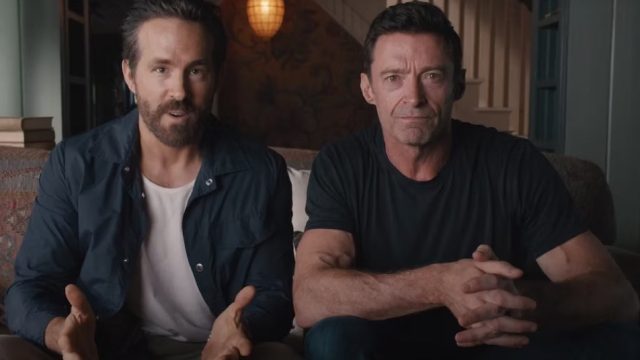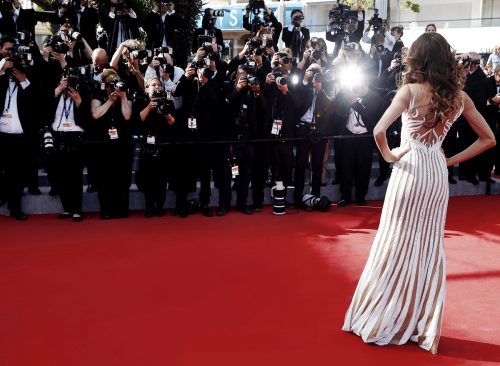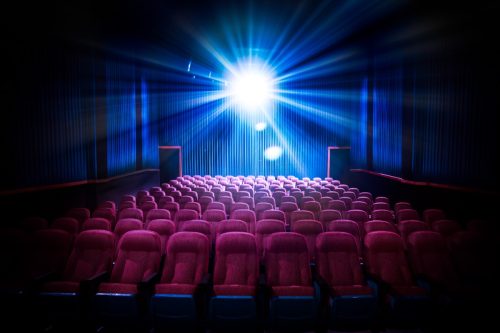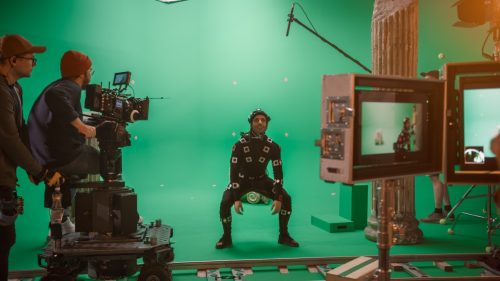
In a resolute display of unity, approximately 160,000 television and movie actors have announced their decision to go on strike, starting last night at midnight. This move comes in the wake of the earlier walkout by screenwriters, effectively triggering Hollywood’s first industrywide shutdown in over six decades. Fran Drescher, President of SAG-AFTRA (and star of The Nanny), articulated the underlying concerns, stating, “What’s happening to us is happening across all fields of labor.” The strike serves as a powerful reminder that actors, like workers in various sectors, are standing up against systemic issues that devalue their contributions and compromise their well-being. And it’s not just acting that will be affected. During the strike, SAG-AFTRA members cannot do the following:

As we said, approximately 160,000 television and movie actors are going on strike, joining the screenwriters who previously walked off the job. This action marks Hollywood’s first industrywide shutdown in over six decades, impacting the production of countless projects and drawing attention to the labor concerns faced by actors. That means projects currently filming, like the new Deadpool sequel and American Horror Story, must stop filming immediately.

In solidarity with the striking screenwriters, actors are also ceasing their singing engagements. This decision underscores the unified front presented by SAG-AFTRA members, as they collectively demand fair treatment and equitable working conditions across the entertainment industry.

As part of the ongoing strike, actors will temporarily halt their dancing performances. This move demonstrates the collective effort of industry professionals to address concerns related to wages, working hours, and fair contracts, fostering an environment of respect and fairness within the entertainment sector.

Stunt work will be put on hold during the strike as actors refuse to perform potentially dangerous actions on set. This decision emphasizes the importance of ensuring the safety and well-being of industry professionals while simultaneously advocating for improved working conditions.

To amplify their cause and assert their presence as essential contributors to the entertainment industry, actors will refrain from making personal appearances during the strike. This step highlights their commitment to the strike and the issues at stake, demanding fair compensation and recognition for their contributions.

During the strike, actors will decline interview requests, limiting their public presence. By doing so, they aim to draw attention to the labor-related challenges they face, seeking fair treatment, improved working conditions, and a more equitable industry landscape for all professionals.

Actors’ participation in podcasts will be suspended throughout the strike, reinforcing their dedication to collective action and demanding fair treatment. By withholding their presence in this medium, actors are sending a strong message about the importance of fair wages and working conditions.

The strike will disrupt actor appearances at conventions, underscoring the impact of their absence on fan events and industry gatherings. By refusing to attend these conventions, actors aim to raise awareness about the need for fair treatment and equitable practices within the entertainment industry.

Actors’ presence at fan expos will be put on hold as the strike seeks to address concerns affecting both the industry and its dedicated fans. This collective action draws attention to the valuable contributions of actors and their commitment to securing fair treatment and labor rights.

Participation in festivals will be suspended during the strike, temporarily altering the landscape of these popular showcases of talent and creativity. This disruption serves as a reminder of the pivotal role that actors play in the entertainment industry and their demand for fair and equitable treatment.

With the strike in effect, actors will not attend “For Your Consideration” events, where industry professionals campaign for awards recognition. This decision highlights their commitment to achieving fair labor conditions and equal opportunities for all actors, irrespective of their stature or affiliations.

During the strike, actors will abstain from participating in industry panels, prompting a pause in the exchange of ideas and insights among industry peers. This action underscores the actors’ dedication to achieving fair labor practices and advocating for meaningful industry reforms.

The strike will temporarily halt the glamorous red carpet premieres and screenings that showcase the work of actors, underscoring their collective efforts to bring attention to labor-related issues. This hiatus draws focus to the essential role of actors in the entertainment industry and the need for their fair treatment and recognition.

As a result of the strike, award shows will experience a hiatus, with actors abstaining from attending and accepting awards. This pause demonstrates the significant impact of their absence on the industry’s prestigious events and highlights their commitment to achieving fair labor conditions and equitable recognition.

Actors’ participation in promotional press junkets will be put on hold, redirecting attention to the labor concerns that prompted the strike. By withholding their involvement in these marketing activities, actors are striving to emphasize the importance of fair wages, reasonable working hours, and improved working conditions.

Voice actors will temporarily cease their work during the strike, acknowledging the essential role they play in the entertainment industry. By joining the strike, they stand in solidarity with fellow actors, demanding fair treatment and equitable working conditions across all sectors of the industry.

SAG-AFTRA members involved in singing engagements will suspend their performances, aligning with the strike and its broader goals. This unified action aims to draw attention to the shared concerns of all actors, regardless of their specific artistic specialties.

During the strike, actors will refrain from providing narration services, emphasizing the united front of industry professionals demanding fair treatment. By withholding their narration work, actors aim to bring attention to the need for equitable compensation and improved working conditions in this specialized field.

In support of the strike, actors will reduce their presence on social media platforms, directing attention towards labor-related issues and industry reform. This intentional step aims to raise awareness among the public and industry stakeholders about the need for fair treatment and improved working conditions.

As part of the strike, actors will abstain from participating in studio showcases, influencing the promotional landscape for upcoming projects. By withholding their involvement, actors highlight the integral role they play in the success of these showcases and demand fair treatment and recognition for their contributions.

Actors’ participation in tours will be temporarily halted, emphasizing their commitment to collective action and labor rights. This pause in tours aims to bring attention to the challenges faced by actors, including fair wages, reasonable working conditions, and overall industry reform.

Safety concerns during the strike prompt actors to refuse to pilot on-camera aircraft, underlining the importance of secure working conditions. This action reflects their commitment to protecting their well-being and demanding appropriate safety measures as part of their labor rights.

In solidarity with other striking professionals, actors will suspend their puppeteering roles, demonstrating their dedication to industrywide change. This unified stance reinforces the actors’ demand for fair treatment and equitable working conditions across all facets of the entertainment industry.

Actors involved in performance capture or motion capture work will temporarily halt their activities, advocating for fair treatment and labor standards. By joining the strike, these actors assert their importance and demand equitable compensation and improved working conditions in this specialized field.

During the strike, actors will abstain from principal off-camera work, such as ADR/looping, TV trailers (promos), and theatrical trailers, highlighting the scope of their protest and its impact on various aspects of production. This collective action underscores the interconnectedness of all industry roles and emphasizes the actors’ demand for fair treatment, recognition, and improved working conditions across the board.














